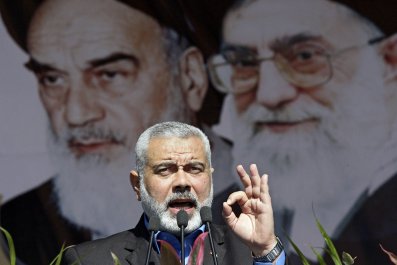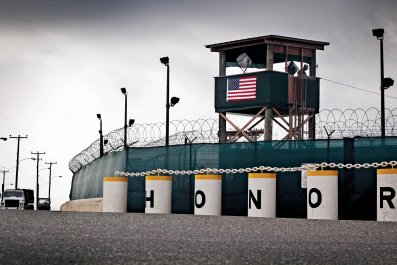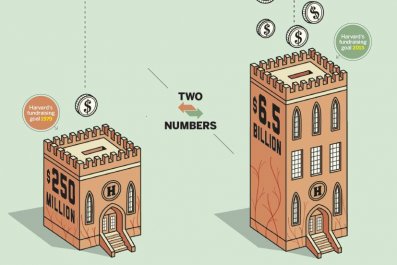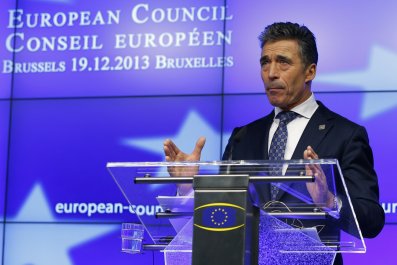In the summer of 1997, Larry Summers, then the deputy treasury secretary in the Clinton administration, was having a private meeting with a senior Wall Street executive who oversaw his bank's international operations. The executive had been watching with concern the mounting turmoil in the financial and property markets of Thailand, the small Southeast Asian country that normally wouldn't warrant much high-level attention in the corridors of Washington power.
Summers listened to the man politely, but he was underwhelmed. Thailand represented less than 1 percent of total trade with the U.S., and the size of its economy was, relatively speaking, tiny. The message from Summers was straightforward: Don't you worry your little head about such a thing.
The financial chaos that ensued in the wake of Summers's insouciance—the so called East Asian economic crisis, which over the next year led to defaults and devaluations from South Korea to Russia—has been very much on the minds of policymakers in Europe and the United States as they have wrestled with how quickly and how forcefully to ratchet up sanctions in the wake of Vladimir Putin's aggression in Ukraine.
Europe's addiction to Russian gas has, of course, been an issue, and so too have the concerns of Germany's manufacturers, which do extensive business in Russia. But government and private sector sources alike say that in the wake of the downing of Malaysia Airlines Flight MH17, Germany's finance ministry, the chancellor of the exchequer in London, the U.S. Department of the Treasury and the Federal Reserve have all been focused on the need to punish Russia more harshly. And they recognize the potential for that punishment to create what one source called "serious blowback in global markets" as a result of stiffer financial sanctions against Moscow—which all agreed were necessary in the wake of the crash, and which both the EU and the U.S. delivered in late July. "Believe me, we've learned the 'when a butterfly flaps its wings bad stuff can happen' lesson," said the U.S. source.
That risk, they have come to believe, is significant, if not necessarily inevitable. Russia's financial system has become a decent-sized butterfly. Moscow dismantled capital controls on its financial sector in 2006, and since then its banks have become more intertwined with the European and, to a lesser extent, U.S. financial systems.
Members of the Bank of International Settlements (BIS) reported total exposure to Russia of $173.7 billion as of March 2014—up from $155.4 billion at the end of 2011. Though that is not much relative to, say, lending to China—which now amounts to over $1 trillion from BIS members—"it's still serious money," says a European banker in Moscow. Further, corporate borrowers in Russia last year raised $52.2 billion in non-ruble debt last year.
The financial sanctions the EU and U.S. announced in late July are likely, sources say, to accelerate two trends that were already evident in the wake of Russia's seizure of Crimea earlier this year: capital flight from Russia and what one senior banker called the "silent sanction" of diminishing credit lines from Western banks to Russia ever since. As of June, roughly $75 billion has fled Russia this year, and on July 25—before the new sanctions were announced—the Russian central bank increased its key interest rate to defend the ruble and try to mitigate capital flight. Since then, however, the ruble has continued to weaken, though not, as of August 1, dramatically so.
Meanwhile, corporate bond issuance in Russia has collapsed, from $52.2 billion in non-ruble debt raised last year to just $9.8 billion so far in 2014, according to Nomura Securities. And major Western banks have quietly been cutting off credit to the entire Russian economy. On July 29, Bank of America said in a regulatory filing that its net exposure to Russia was $3.94 billion, down sharply from $6.72 billion at the end of last year. And the U.K.'s Royal Bank of Scotland said on August 1 that it was going to rein in lending to Russia in the wake of sanctions. The bank said it currently has net exposure of $2.4 billion to Russia.
While the additional European sanctions were, overall, tougher than many skeptics had believed possible (even in the wake of MH17), financial officials note that they were drawn in such a way as to try to limit the possibility of "contagion" that might redound throughout the EU. The financial curbs bar major Russian banks such as VTB from raising funds in the West in the medium and long term, but not from rolling over short-term foreign debt, which totals $33.5 billion and comes due in 90 days or less.
Also, the European subsidiaries of banks like VTB and Sberbank—Russia's largest in terms of total deposits—are left alone. They will be allowed to transfer profits and even make loans to their parent companies. Moreover, the sanctions Europe announced will stand for just 90 days. That they are not open-ended, the officials hoped, serves two purposes: Panic within the Russian financial system may be less likely, and it is also hoped that this might create incentives for Putin to come to a settlement in Ukraine.
Together, said a senior aide to a top German official, the goal was, in essence, to thread the needle: inflict pain on Russia while trying to "mitigate against the risk of instability" in the European financial system at a very delicate time for the eurozone economically, with fears growing that it could still slip into a deflationary spiral. Indeed, global equity markets dropped sharply on July 31, in part because of renewed fears of another European slump.
There are, to be sure, economists who believe the fears of a Russia-based financial contagion—à la East Asian financial crisis—are overwrought. They point first and foremost to the Russian central bank's mountain of reserves: $472 billion at last count. (By contrast, Indonesia had $20 billion when contagion came calling in 1998 and felled the economy, and Thailand had far less than that.) Russia's central bank chief, Elvira Nabiullina, has said the bank will support the financial system and Russian companies as needed. She also hopes she has made it clear, through three interest rate hikes so far this year, that the bank will move to defend the ruble as it comes under pressure.
Skeptics wonder how long, if sanctions continue, Russia's strong reserve position can last. Should they persist into next year, it's conceivable, according to Moscow economist Sergei Pukhov, that support to banks and state-owned companies could draw down reserves to around $200 billion. And while that sounds like a large amount in the abstract, it amounts to just six months of Russia's imports of goods and services. And even should the reserve level approach that amount, one large European investor told Newsweek, "the fear level in the markets would be enormous. An implosion of the Russian financial system could not be ruled out, and the consequences of that would be far-reaching."
To prevent that, key German officials—including, a German source tells Newsweek, Chancellor Angela Merkel—are quietly but fervently hoping that after a decent interval, Putin will be drawn into talks over Ukraine's fate. Prior to the downing of MH17, Berlin was leading discussions with Moscow over the outline of a possible deal, trying to get a sense of what might fly.
Key aspects included Moscow's insistence that the Crimean referendum declaring its population's desire to rejoin Russia be recognized; Russia in turn would cease its support for the rebels in eastern Ukraine, and also pay Kiev $1 billion or more for its claims on Crimea; and Russia and Ukraine would try to renegotiate a long-term supply deal for natural gas.
Kiev was not wild about some of these terms, but a source tells Newsweek that the Russians had been engaged, and that they can form the basis for talks, and a possible deal, going forward. "We hope perhaps within 90 days," said a European official with knowledge of the negotiations. Should that not happen, Europe's markets—and the world's—could feel a very chill wind coming from the East.




























